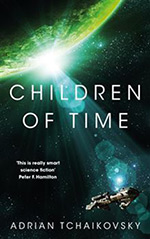
![]() bazhsw
bazhsw
9/24/2016
![]()
SOME MINOR SPOILERS IN THE REVIEW
I've been meaning to review this all week and haven't got around to it. I don't often dish out five stars, tending to reserve them for 'life changing' books but by gosh I really, really loved this! There is so much going on in here, so many ideas, perspectives and themes I don't think my review will give the book justice.
We've got space opera, some hard sci-fi, questions about evolution, sentience, religion, gender roles, a great story, characters that would be so hard to get right (being spiders and all) that end up being totally relatable (indeed I think the spider characterisation is better than the human characterisation).
For me, all great science fiction starts with the question, 'What If?'. This book has 'what if's' everywhere and more than just answering the question our author tries to develop the thinking and answer the question.
This book is really, very, very clever. It's clearly a labour of love and despite how much has gone into this I was never bored, I was always engaged and always wanted to read more.
So, the 'What If?' in this book is 'what would happen if humanity wanted to terraform other words and wanted to restart human evolution on those planet?'. The next 'What If?' is, 'what would happen if primates did not become the dominant species?' This is a book about spiders and it transcends millennia. I was reminded a little about Brian Aldiss' Helliconia trilogy that spans evolutionary periods, however in Helliconia I was often bored, thinking 'get on with it!' - here, I didn't feel anything of the sort. In this book we follow the evolution of spiders through their initial hunter / predator beginnings, their first use of tools and co-operation, the spread of society, wars between spiders and against other species. The spiders evolution closely follows that of Western Civilization - the looking to the stars, the development of art and culture and the discovery of religion. Yep, there is a lot going on! My favourite elements concerned how the spiders addressed communication and their unique solutions to technological problems. Of course the parallels with human history are there (human footprints are EVERYWHERE) but the approach is just so different.
I also really enjoyed reading about the treatment of male spiders - the parallels to women in western civilization's history are clear. The males dance and preen and seek favour from female spiders but have virtually no worth in spider society, are considered unintelligent and 'not really spider'. You don't have to look far to see the parallels with the great democracy of Ancient Greece (the great democracy that didn't include women or slaves), you see attitudes to race and the racist thought processes of centuries past where races were classified and others seen as 'less human'.
Towards the end of the novel I was actually breathless with excitement as the story came to a close and the spiders made greater leaps (see what I did there!). I really rooted for them!
But this is not just a novel about spiders, it's a novel about humans too. Well, here are some more spoilers everyone - just as humanity tries to terraform 'spider planet' back on Earth we manage to get into a massive war and pretty much wipe out our species. The remnants that crawl out of the Ice Age sludge manage to develop themselves to the space race and once again manage to kill themselves again. A handful of Ark ships set off into space to find somewhere to live. There really is an 'Exodus' / Biblical vibe to this book and it's pretty cool. Humans hit spider planet, are warned off and do the biggest 'U' Turn ever. Thousands of years later they go back to spider planet. The Ark ships are pretty cool as pretty much everyone is kept in suspension for thousands of years 'until something happens'. As the centuries past, this particular plot line develops and characters who have only been awake for a few weeks see young people turn into elderly people dependent on how long they've been 'out'. A new world and society grows on ship - their only shared history is that of the ship only. The novel is quite disparaging about humanity - our solution to our problems is 'hit it' and we get into a total failure to learn that 'hitting it' has never worked.
The end of this book is totally awesome too. Just a great book!